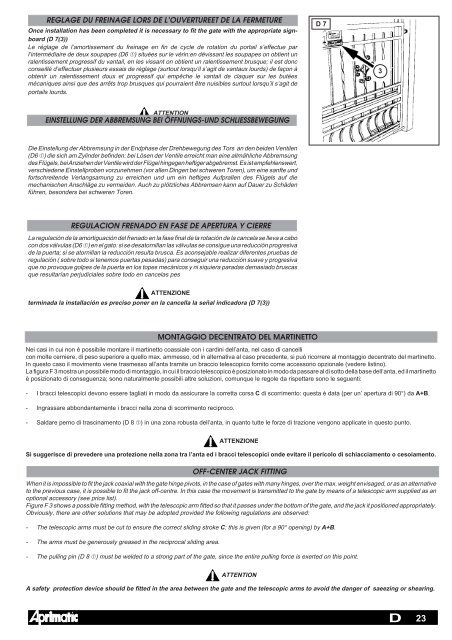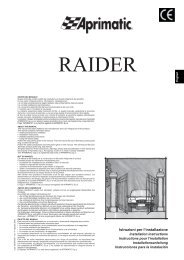ZT 71 ZT 72 - Cyclon Engineering
ZT 71 ZT 72 - Cyclon Engineering
ZT 71 ZT 72 - Cyclon Engineering
Create successful ePaper yourself
Turn your PDF publications into a flip-book with our unique Google optimized e-Paper software.
REGLAGE DU FREINAGE LORS DE L’OUVERTUREET DE LA FERMETURE<br />
Once installation has been completed it is necessary to fit the gate with the appropriate signboard<br />
(D 7(3))<br />
Le réglage de l’amortissement du freinage en fin de cycle de rotation du portail s’effectue par<br />
l’intermédiaire de deux soupapes (D6 ➀) situées sur le vérin:en dévissant les soupapes on obtient un<br />
ralentissement progressif du vantail, en les vissant on obtient un ralentissement brusque; il est donc<br />
conseillé d’effectuer plusieurs essais de réglage (surtout lorsqu’il s’agit de vantaux lourds) de façon à<br />
obtenir un ralentissement doux et progressif qui empêche le vantail de claquer sur les butées<br />
mécaniques ainsi que des arrêts trop brusques qui pourraient être nuisibles surtout lorsqu’il s’agit de<br />
portails lourds.<br />
ATTENTION<br />
Après EINSTELLUNG avoir terminé l’installation, DER ABBREMSUNG appliquer BEI sur ÖFFNUNGS-UND le portail la plaquette SCHLIESSBEWEGUNG<br />
signalétique (D 7(3))<br />
Die Einstellung der Abbremsung in der Endphase der Drehbewegung des Tors an den beiden Ventilen<br />
(D6 ➀) die sich am Zylinder befinden: bei Lösen der Ventile erreicht man eine allmähliche Abbremsung<br />
des Flügels, bei Anziehen der Ventile wird der Flügel hingegen heftiger abgebremst. Es ist empfehlenswert,<br />
verschiedene Einstellproben vorzunehmen (vor allen Dingen bei schweren Toren), um eine sanfte und<br />
fortschreitende Verlangsamung zu erreichen und um ein heftiges Aufprallen des Flügels auf die<br />
mechanischen Anschläge zu vermeiden. Auch zu plötzliches Abbremsen kann auf Dauer zu Schäden<br />
führen, besonders bei schweren Toren.<br />
REGULACION FRENADO EN FASE DE APERTURA Y CIERRE<br />
La regulación de la amortiguación del frenado en la fase final de la rotación de la cancela se lleva a cabo<br />
con dos válvulas (D6 ➀) en el gato: si se desatornillan las válvulas se consigue una reducción progresiva<br />
de la puerta; si se atornillan la reducción resulta brusca. Es aconsejable realizar diferentes pruebas de<br />
regulación ( sobre todo si tenemos puertas pesadas) para conseguir una reducción suave y progresiva<br />
que no provoque golpes de la puerta en los topes mecánicos y ni siquiera paradas demasiado bruscas<br />
que resultarían perjudiciales sobre todo en cancelas pes<br />
ATTENZIONE<br />
terminada la installación es preciso poner en la cancella la señal indicadora (D 7(3))<br />
Nei casi in cui non é possibile montare il martinetto coassiale con i cardini dell’anta, nel caso di cancelli<br />
con molte cerniere, di peso superiore a quello max. ammesso, od in alternativa al caso precedente, si può ricorrere al montaggio decentrato del martinetto.<br />
In questo caso il movimento viene trasmesso all’anta tramite un braccio telescopico fornito come accessorio opzionale (vedere listino).<br />
La figura F 3 mostra un possibile modo di montaggio, in cui il braccio telescopico è posizionato in modo da passare al di sotto della base dell’anta, ed il martinetto<br />
è posizionato di conseguenza; sono naturalmente possibili altre soluzioni, comunque le regole da rispettare sono le seguenti:<br />
- I bracci telescopici devono essere tagliati in modo da assicurare la corretta corsa C di scorrimento: questa è data (per un’ apertura di 90°) da A+B.<br />
- Ingrassare abbondantemente i bracci nella zona di scorrimento reciproco.<br />
- Saldare perno di trascinamento (D 8 ➀) in una zona robusta dell’anta, in quanto tutte le forze di trazione vengono applicate in questo punto.<br />
ATTENZIONE<br />
Si suggerisce di prevedere una protezione nella zona tra l’anta ed i bracci telescopici onde evitare il pericolo di schiacciamento o cesoiamento.<br />
When it is impossible to fit the jack coaxial with the gate hinge pivots, in the case of gates with many hinges, over the max. weight envisaged, or as an alternative<br />
to the previous case, it is possible to fit the jack off-centre. In this case the movement is transmitted to the gate by means of a telescopic arm supplied as an<br />
optional accessory (see price list).<br />
Figure F 3 shows a possible fitting method, with the telescopic arm fitted so that it passes under the bottom of the gate, and the jack it positioned appropriately.<br />
Obviously, there are other solutions that may be adopted provided the following regulations are observed:<br />
- The telescopic arms must be cut to ensure the correct sliding stroke C: this is given (for a 90° opening) by A+B.<br />
- The arms must be generously greased in the reciprocal sliding area.<br />
MONTAGGIO DECENTRATO DEL MARTINETTO<br />
OFF-CENTER JACK FITTING<br />
- The pulling pin (D 8 ➀) must be welded to a strong part of the gate, since the entire pulling force is exerted on this point.<br />
ATTENTION<br />
A safety protection device should be fitted in the area between the gate and the telescopic arms to avoid the danger of saeezing or shearing.<br />
D 7<br />
3<br />
D<br />
23



